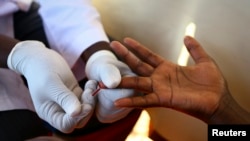It is not a cure, nor a vaccine, but experts at the International AIDS Conference in Durban, South Africa are optimistic about a pill that could prevent the spread of HIV.
Pre-exposure prophylaxis, or PrEP, is a key topic at this week’s conference. According to a recent study unveiled at the conference, people who take a pill of antiretroviral drugs each day, often the same pill that HIV-positive people take, showed extremely low rates of HIV transmission.
Chris Beyrer, the president of the International AIDS Society, lauded the results at the conference, “Now is really the time to start the PrEP access era,” he said.
Seven countries have approved the use of PrEP, and it is increasing in the United States among high risk groups. In South Africa, the program has been tested, with good results among sex workers.
Hetero Drugs Limited is an Indian pharmaceutical company that specializes in generic drugs. About 2.5 million Indians are known to have HIV.
“It is advised that a person who is at risk of developing HIV should take two pills before the intercourse and two pills within 24 to 48 hours after the intercourse,” Hetero’s international marketing manager, Rahul Lande, told VOA News.
"And the success rates for these studies are showing like 97 percent rate, and those three percent are those that did not take pills, basically. So it’s quite a successful study.”
Cameron Cox, a sex worker and activist in Sydney, said neither he nor his partner use PrEP because both men are HIV-positive. He said he is cautiously supportive of PrEP and that some of his male clients use the treatment.
"The boys who have gone on to PrEP, even though that when they come to see me, we still use condoms, they are much more comfortable having sex and they are much more relaxed, and they tell me that when they have sex, say, privately, non-commercial sex with other partners, that they feel much better about having sex," he said. "They're not all the time scared that this is maybe going to be the time that there's a slip-up and something happens and they seroconvert. So it's a wonderful thing for their mental health, if you know what I mean."
But, he said, he is worried that PrEP may lull people into a false sense of security. If the HIV rate falls among people with high risk, like men who have sex with other men, it may foster a false sense that the epidemic is no longer a threat, and people of all risk levels may stop taking precautions against HIV, he says.
Indian sex worker Kiran Deshmukh, who is HIV-positive, says she welcomes any advance in the fight against HIV. She proudly noted that none of her three children are HIV-positive because she was able to take precautions to prevent transmission of the disease.
But she said it's impossible to talk about sex and HIV without talking about trust.
"I would not have any problem with my partner using PrEP," she said, "but my basic question would be: when I'm already using a condom 24-7, why would you need to use PrEP as an additional medication?"
Like many questions that swirl around the AIDS virus, it's one that science alone cannot answer.

